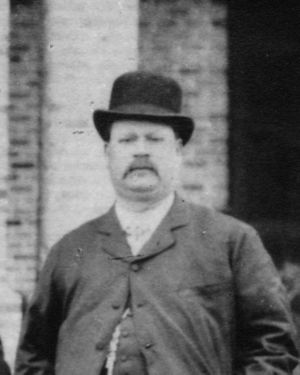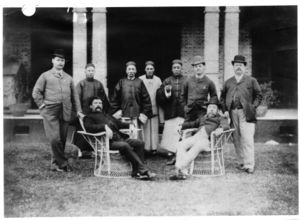Henry Bridges Endicott
| Henry Bridges Endicott | |
|---|---|
 | |
| Born | Shanghai |
| Died |
5 January 1895 Shanghai |
| Resting place | Shanghai |
| Nationality | American |
Contents
Biography
Service
Henry B. Endicott joined Butterfield & Swire
as Head Shipping Clerk in February 1873,
after being headhunted from the US firm
of Augustine Heard & Co. An American and
a fluent Chinese speaker, he was known to
have excellent connections throughout the
chartering and shipping community, and John
Samuel Swire believed he was the right man
for what he envisaged would be a fight to the
death with China Navigation’s main rival on the
Yangtze, the Shanghai Steam Navigation Co.
Endicott more than justified his faith,
building CNCo into the most profitable
company on the river and seeing Shanghai
SNCo - controlled by the American firm,
Russell & Co. - collapse into bankruptcy.
On the coast, it was his skilful management
and tactful negotiations with shippers that
saw CNCo secure a monopoly of the lucrative
‘beancake’ trade. During his 21 years with
B&S, Endicott was one of its highest paid
employees, on a par with Swire’s Shanghai
Taipan. His position was unique and he made
himself indispensable - a fact that tended
to frighten Shanghai management, who felt
they had created a monster: ‘We raised up
E. into a one-man department’ admitted one
Taipan, Edwin Mackintosh, ‘Lang [his own
predecessor] was too ignorant and supine to
control him.’
Endicott’s right-hand was CNCo’s
first comprador, Cheng Kuan-Ying. Born in
Guangdong province in 1842, Cheng had been
comprador to the Union Steam Navigation
Company - the bankrupt Yangtze company
bought out by CNCo in 1872, as the basis for
its incipient operations. The role of comprador
involved canvassing, or ‘drumming’ for cargo
and passengers, passenger ticketing and
management of the company’s godowns.
It was a senior position of implicit trust and
as Cheng would later write: ‘All matters
relating to the promotion of freighting business
and to personnel were handled by myself,
in consultation with the American, Yen-er-chi
[Endicott].’
The pair made a ruthless team and
some of their imaginative, if questionable,
canvassing methods would have startled
their Taipan, had he known of them at the time.
When Russell’s were suspected of offering
sweeteners to charterers to secure cargo,
Endicott had no qualms about doing the same.
Russell’s Manager, R.B. Forbes, was soon
bleating: ‘Cargo promised to us is taken away
to their steamers, ...our oldest and best friends
among local freight agents tell us that the
opposition offers so much better terms...’.
In 1882, Cheng moved on to greater
things when he accepted the position
of Assistant Manager of the government controlled
China Merchants Steam
Navigation Co. - a company that had come
into being at about the same time as CNCo
and had rapidly grown in importance, taking
over the Shanghai SNCo after its bankruptcy
in 1877. He later wrote that it was with mixed
feelings that he eventually took the decision
to leave Swire, because of his high regard
for the firm’s business ethics. On Cheng’s
recommendation, his protégé, Yang Kwei
Hsian, took over his role of CNCo comprador
alongside Endicott. But, two years later,
Yang suddenly committed suicide and it was
discovered that he had been pocketing large
amounts of CNCo freight. For fraud on such a
scale to have gone undetected pointed to an
inexplicable lack of judgement on Endicott’s
part: naively, he had assumed he could
place the same level of trust in Cheng’s
chosen successor.
In customary fashion, comprador Yang’s
good character had been secured by three
financial guarantors – one of whom was
Cheng. But the amount of the loss was so great
that the men had no hope of repaying it. The
matter ended in court and was finally settled
with CNCo writing off half the amount, while
Yang’s guarantors gave promissory notes for
the balance - which they duly honoured. It was
a costly lesson and highlighted the iniquities
of the outmoded comprador system.
Endicott was left to lick his wounds – and to implement far stricter controls on the collection of freight monies. He never quite recovered his indomitable position – though his part in the success of CNCo’s early decades is undeniable. He died from a heart attack in 1895, at the age of 73, resisting all attempts to persuade him to retire and hand over the reins of CNCo to a younger man.

